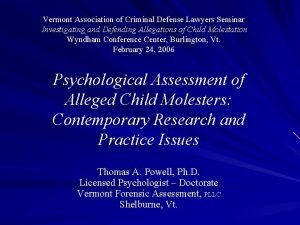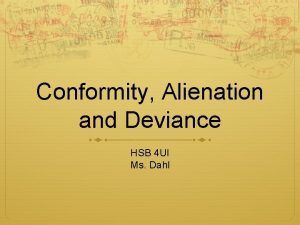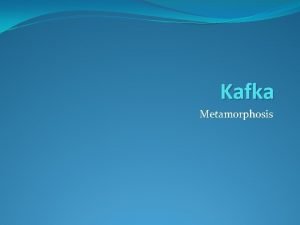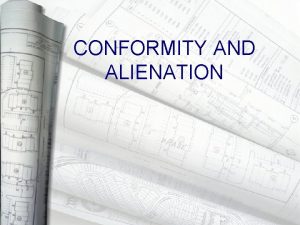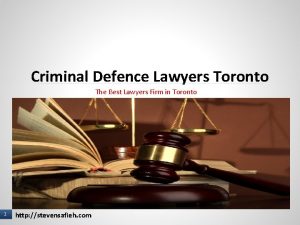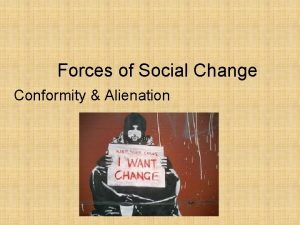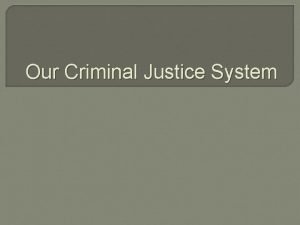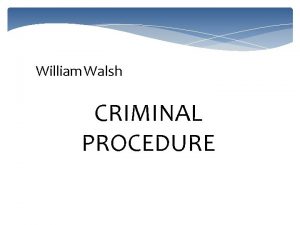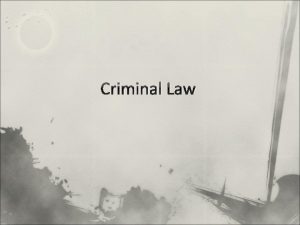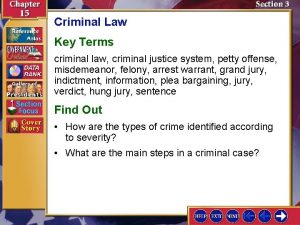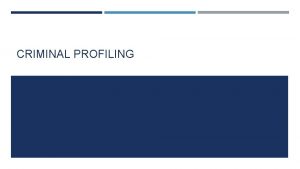The Practices of Modern Criminal Defence Lawyers Alienation











- Slides: 11

The Practices of Modern Criminal Defence Lawyers: Alienation and (Lack of) Resistance Daniel Newman (Cardiff, UK) Lucy Welsh (Sussex, UK)

POLITICAL CONTEXT v Policies based on a neoliberal style of governance have negatively impacted the criminal justice process by undermining lawyers’ ability to act as autonomous decision making professionals (see e. g. Sommerlad, 2001 and 2008; Cape, 2004). v Economic calculations become dominant in how areas of the state function, and underpin judgments as to whether they operate successfully or not: notions such as justice and fairness seem to have been supplanted by rational calculation about the efficiency of the system. v Criminal defence lawyers accept that their role has been compromised by structural change in the last decade, and that their ability to provide good quality defence services has been (further) hindered by relentless change in the context of constrained access to funds (Cape, 2004, Welsh, 2017). v The profession is demoralised but lawyers appeared to accept their fate as members of an undervalued part of the welfare state rather than actively counteract, in their day-to-day practice, structural change which further challenged their role and professional identity.

METHOD/METHODOLOGY v Case studies: in-depth findings in relation to the complexities of specific situations (Bryman, 2012) v Study 1 v. Data collection took place in 2008 and 2009 v. Observation of nine months was split equally between three firms, followed by a month each of semi-structured interviews with the same lawyers. v Study 2 v Data gathered in 2013. v. Observations followed by semi-structured interviews with 19 advocates (12 defence lawyers and seven prosecutors) v Thematic analysis that draws on theories of alienation grounded in a Marxist tradition.

‘IDEAL’ LAWYERS v 1960 s and early 1970 s, government policy tended to be receptive to professionalization; lawyers were expected (by officials and the public) to make autonomous decisions about what would be in the best interests of any given case based on their expert knowledge and ethical guidance issued by their regulatory bodies. v. Smith (2013) describes three sets of duties; those owed to the client, to the court and to the public. v. Contributed to the creation of a profession which traditionally identifies with symbolic (individualised, procedurally rigorous) approaches to justice (Tata, 2017) v 1980 s onwards, the traditional role of the professional generally, and the defence lawyer specifically, has been significantly undermined. v. Greater levels of regulation and evolution of franchising v. Reduced funding v. Detailed case management duties and the introduction of the Criminal Procedure Rules in 2005 v. Given that lawyers’ professional image is crucial to analysing approaches to practice (Newman, 2017), it is important that we try to understand why lawyers have largely been co-opted into processes which seem to damage not only their clients best interests but also their own.

MODERN LAWYERS’ BEHAVIOUR v Cohesive courtroom workgroups (Carlen, 1976; Young, 2013) v Mc. Conville et al (1994) demonstrated that the problems of co-operative behaviour at the expense of adversarialism had only worsened, with lawyers often compromising their clients’ interests for the sake of accepted workgroup behaviour; cooperative rather than zealous advocacy. v Managerialism: levels of regulation and bureaucratisation increased. v. Lawyers move ever further away from a role in which they had been afforded autonomy where the application of rules is reliant on professional judgement (Welsh, 2017). v. Wacquant (2009): economic deregulation creates an insecure underclass who are cast outside society by welfare state retraction. v. Green (2016) has discussed how easy it is for the rule of law to be undermined in an austerity drive, with the legal system easily written off by politicians playing up to reductive popular sentiment that the law is the domain of out of touch judges, fat-cat lawyers and undeserving criminals.

APPLYING MARX TO LAWYER BEHAVIOUR v Shantz et al (2015) called for the recovery of an old philosophy from the field of political economy to help explain current labour trends under neoliberal austerity v Alienation meant loss of control, specifically the loss of control over labour. As ‘justice’ is the defence lawyers’ product, alienation experienced by this group leads to loss of control over ‘access to justice’. v. Swain (2012) has recently identified the absence of contemporary work on alienation in any discipline. v Contemporary working practices impact upon the quality of representation and therefore the quality of justice, which impacts the quality of life for both lawyers and their clients (and families etc. )

APPLYING MARX TO LAWYER BEHAVIOUR v Defence lawyers operate under a particularly complex employment regime v. Lawyers thus face limitations to their autonomy in directing a case, which have caused criminal legal aid lawyers to become detached fromthe product of their labour; having full control over a case such that they feel free to do what is best for their client. v. As the system becomes increasingly complex through regulation, those operating within it become increasingly disoriented, which can prevent members from formulating ideas for and giving effect to change (Ferretter, 2006). v. Without autonomy, the pattern of work becomes monotonous, unsatisfying and, ultimately degrading, characterised by repetition and triviality. v The drive for guilty pleas and the internalisation of systemic crime control messages (that convicting the guilty is paramount) pressures and encourages defence lawyers to view clients through this lens and to process them accordingly. v. The explicit and implicit denigration of this area of practice has reinforced the impression that it lacks social value; defence lawyers are not valued as they should be. Traditionally, the legal profession is of high social status; moreover, legal aid lawyers consider their work to be virtuous and important but lawyers feel patronised as the poor relations of lawyers in better-remunerated branches of the profession v Boni le Goeff et al (2017) argue, expanding on Marxist theory, that there appear to be four types of alienation experienced by lawyers in neoliberal markets; powerlessness (dependence on bosses/clients meaning autonomy is lost), purposelessness (lack of social utility), unfairness (unfair treatment) and work/life conflict (long hours etc. ).

THE DATA: POWERLESSNESS v Organisational practice of discontinuous representation was implemented as standard, so lawyers were allocated to cases on an ad hoc and, primarily, cost-effective basis, often swapping cases during a busy day: ‘the numbers game’ v Lawyers are given financial encouragement to persuade clients to plead guilty early but will lose money if cases go to trial and would talk about the importance of ‘getting the client to plead guilty’ v Sense of resignation about the way the system operates: v‘It’s tough because you just get used to it and it is what it is’ v‘You could sort of argue ‘til you’re blue in the face that the work you do and the fees haven’t gone up since, what, 1997 but there’s simply not going to be more money. ’ v Weakened professional standing resulted in further powerlessness in asserting decisions with force.

THE DATA: PURPOSELESSNESS v Lawyers identified a social agenda as fundamental to their practice: ‘what we do is a social good’, ‘we stand up for the people that nobody else cares about…we do something worthwhile’. v In the process of discontinuous representation and the lawyers’ co-option into a system in which they were expected to push clients through towards as early a guilty plea as possible, it seems as though the humanity of the clients was lost. v‘If you’re representing four or five clients, as you will frequently do, with legal aid you spend half the time that you are physically in court filling in legal aid forms when that time could be more profitably put to actually sitting down and advising the clients. ’ v‘The problem for me is that you spend more time chasing legal aid, chasing means testing, chasing that than you do actually preparing the case and what’s the point of that’. v The Court doesn’t really care what they do: v‘The impression I get that Court clerks, magistrates and indeed the Crown and sometimes the defence deal with these cases is overly prescriptive and doesn’t allow sufficient flexibility, and the old mantra of whether your client knows he did it or not. Well yes he may well know whether he did it or not but that’s not really what the criminal procedure’s about is it? Otherwise they would just put people into the dock and say “hello what have you done? ” That’s not the way it works. You’ve got to know and understand the case against your Client and be able to advise your clients as to whether or not the Crown can prove the case. ’

THE DATA: UNFAIRNESS v Lawyers thought it unfair that they were doing something so devalued: ‘I'm sick of being treated like shit because I work with criminals’. v Low remuneration, especially compared to other branches of the legal profession v. Procedure for obtaining funding is ‘overly onerous’ Court has no sympathy with the problems that defence solicitors face in obtaining funding: ‘I think they’re perfectly aware of it but they choose to ignore it because they’ve now got a guideline that says “crack on”. ’ v Demotivated and undermined: v ‘I think that everyone’s demotivated and the court is in a worse situation than I’ve ever known it’. v ‘I don’t understand how the Government expects you to work without being paid. You wouldn’t say that to a doctor would you? … It’s like what your parents say to you when you’re a kid ‘if you don’t like it, it’s my house, it’s my rules, you’ll get what you’re given. v ‘I think that we have become devalued by the Government, I think we have become devalued by the courts, I don’t think we’re shown the respect that we used to be shown… I think the profession is generally demoralised… I think we are a profession and we should have been treated like a profession and I don’t think we are any more. I think we’re treated like a commodity. ’

CONCLUSIONS v Criminal legal aid lawyers have become detached from the potential for their work to serve justice and to help people, the quest for efficiency sublimates their practice. v The public service ideal has been superseded by a more pragmatic sense of business imperatives, which appears to have undermined the sense of purpose lawyers felt about their role. v As the service that lawyers provide declines, they seem to lose their professional standing and, therefore, their power because their status no longer holds value. This could produce further feelings of unfairness that alienate lawyers further from their clients, and from the public service ideal that they once stood for. v. Promoting understanding that properly functioning legally aided criminal defence is something worth fighting for as a social good seems an important means to push back against the neoliberal ideology that allows practice to be degraded – but lawyers, as we have shown, may be relatively powerless to perform that task. v The sum of the research offered and cited in this paper is that criminal legal aid emerges as a degraded practice, with these lawyers’ professional status debased and their socio-cultural standing reduced as the nature of their work is significantly compromised. Crucially, these trends to undermine legal practice can be identified as the result of a wider political project.
 Vermont association of criminal defense lawyers
Vermont association of criminal defense lawyers Brechtian alienation effect
Brechtian alienation effect Conformity and alienation
Conformity and alienation Involuntary alienation real estate
Involuntary alienation real estate Alienation as a form of self-protection
Alienation as a form of self-protection Ethan fishman
Ethan fishman Brechtian alienation effect
Brechtian alienation effect Parental alienation lawyer logan county
Parental alienation lawyer logan county V effect theatre
V effect theatre Theory of alienation by karl marx
Theory of alienation by karl marx Alienation metamorphosis
Alienation metamorphosis Occupational alienation
Occupational alienation
